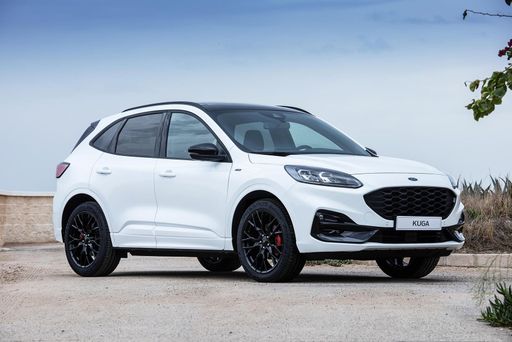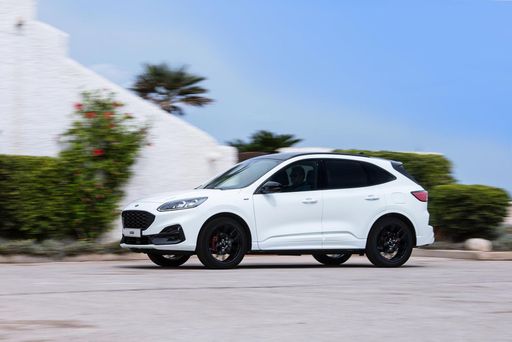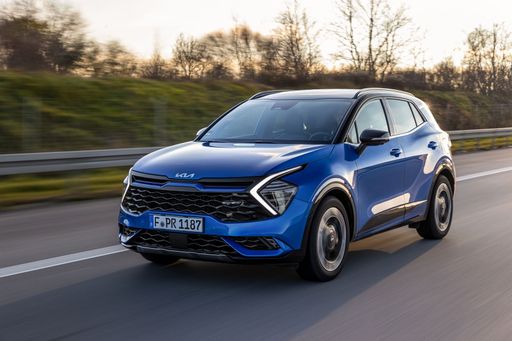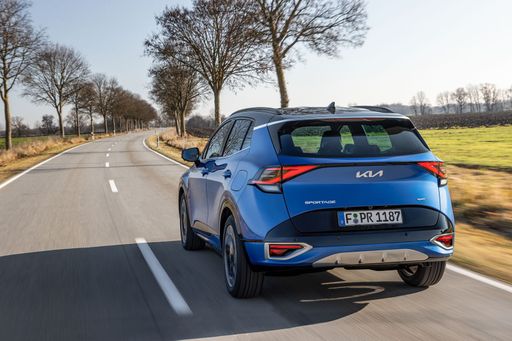Ford Kuga vs Kia Sportage - Differences and prices compared
Compare performance (243 HP vs 239 HP), boot space and price (34200 £ vs 30200 £ ) at a glance. Find out which car is the better choice for you – Ford Kuga or Kia Sportage?
Costs and Efficiency:
When it comes to price and running costs, the biggest differences usually appear. This is often where you see which car fits your budget better in the long run.
Kia Sportage has a somewhat advantage in terms of price – it starts at 30200 £ , while the Ford Kuga costs 34200 £ . That’s a price difference of around 4080 £.
Fuel consumption also shows a difference: Ford Kuga manages with 2.80 L and is therefore significantly more efficient than the Kia Sportage with 5 L. The difference is about 2.20 L per 100 km.
Engine and Performance:
Power, torque and acceleration are the classic benchmarks for car enthusiasts – and here, some clear differences start to show.
When it comes to engine power, the Ford Kuga has a slight edge – offering 243 HP compared to 239 HP. That’s roughly 4 HP more horsepower.
In acceleration from 0 to 100 km/h, the Ford Kuga is slight quicker – completing the sprint in 7.30 s, while the Kia Sportage takes 7.90 s. That’s about 0.60 s faster.
In terms of top speed, the Kia Sportage performs minimal better – reaching 203 km/h, while the Ford Kuga tops out at 200 km/h. The difference is around 3 km/h.
There’s also a difference in torque: Kia Sportage pulls evident stronger with 320 Nm compared to 240 Nm. That’s about 80 Nm difference.
Space and Everyday Use:
Beyond pure performance, interior space and usability matter most in daily life. This is where you see which car is more practical and versatile.
Both vehicles offer seating for 5 people.
In curb weight, Ford Kuga is barely noticeable lighter – 1526 kg compared to 1552 kg. The difference is around 26 kg.
In terms of boot space, the Kia Sportage offers clearly perceptible more room – 587 L compared to 412 L. That’s a difference of about 175 L.
In maximum load capacity, the Kia Sportage performs somewhat better – up to 1776 L, which is about 242 L more than the Ford Kuga.
When it comes to payload, Kia Sportage barely noticeable takes the win – 580 kg compared to 550 kg. That’s a difference of about 30 kg.
Who wins the race?
The Ford Kuga proves to be is largely superior and therefore becomes our DriveDuel Champion!
Ford Kuga is the better all-rounder in this comparison.

Ford Kuga
Costs and Consumption
View detailed analysis
Engine and Performance
View detailed analysis
Dimensions and Body
View detailed analysis
Ford Kuga
The Kuga is Ford’s adaptable family SUV that blends usable space with a surprisingly lively driving character, making daily commutes and weekend escapes equally enjoyable. With smart interior packaging, an easy-to-use infotainment setup and composed road manners, it’s a sensible choice for buyers who want a bit of fun without the fuss.
details


Kia Sportage
The Kia Sportage proves you don't have to choose between style and sensible family motoring, wrapping modern, confident looks around a roomy, well-equipped cabin. It's an easy car to live with — comfortable on daily runs, pleasantly engaging when you want a bit of fun, and kind to your wallet so you can keep smiling at the fuel pump.
details



Costs and Consumption |
|
|---|---|
|
Price
34200 - 46300 £
|
Price
30200 - 43900 £
|
|
Consumption L/100km
2.8 - 6.8 L
|
Consumption L/100km
5 - 7.9 L
|
|
Consumption kWh/100km
-
|
Consumption kWh/100km
-
|
|
Electric Range
68 km
|
Electric Range
-
|
|
Battery Capacity
1.1 - 14.4 kWh
|
Battery Capacity
-
|
|
co2
55 - 154 g/km
|
co2
132 - 180 g/km
|
|
Fuel tank capacity
42 - 54 L
|
Fuel tank capacity
52 - 54 L
|
Dimensions and Body |
|
|---|---|
|
Body Type
SUV
|
Body Type
SUV
|
|
Seats
5
|
Seats
5
|
|
Doors
5
|
Doors
5
|
|
Curb weight
1526 - 1859 kg
|
Curb weight
1552 - 1733 kg
|
|
Trunk capacity
412 L
|
Trunk capacity
526 - 587 L
|
|
Length
4604 - 4645 mm
|
Length
4540 mm
|
|
Width
1882 mm
|
Width
1865 mm
|
|
Height
1673 - 1681 mm
|
Height
1645 mm
|
|
Max trunk capacity
1534 L
|
Max trunk capacity
1715 - 1776 L
|
|
Payload
541 - 550 kg
|
Payload
543 - 580 kg
|
Engine and Performance |
|
|---|---|
|
Engine Type
Petrol, Full Hybrid, Plugin Hybrid
|
Engine Type
Petrol, Full Hybrid, Diesel MHEV
|
|
Transmission
Manuel, Automatic
|
Transmission
Manuel, Automatic
|
|
Transmission Detail
Manual Gearbox, CVT, Automatic Gearbox
|
Transmission Detail
Manual Gearbox, Dual-Clutch Automatic, Automatic Gearbox
|
|
Drive Type
Front-Wheel Drive, All-Wheel Drive
|
Drive Type
Front-Wheel Drive, All-Wheel Drive
|
|
Power HP
150 - 243 HP
|
Power HP
136 - 239 HP
|
|
Acceleration 0-100km/h
7.3 - 9.9 s
|
Acceleration 0-100km/h
7.9 - 11.6 s
|
|
Max Speed
195 - 200 km/h
|
Max Speed
180 - 203 km/h
|
|
Torque
240 Nm
|
Torque
250 - 320 Nm
|
|
Number of Cylinders
3 - 4
|
Number of Cylinders
4
|
|
Power kW
111 - 178 kW
|
Power kW
100 - 176 kW
|
|
Engine capacity
1496 - 2488 cm3
|
Engine capacity
1598 cm3
|
General |
|
|---|---|
|
Model Year
2025
|
Model Year
2025
|
|
CO2 Efficiency Class
E, D, B
|
CO2 Efficiency Class
F, D, E, G
|
|
Brand
Ford
|
Brand
Kia
|
What drivetrain options does the Ford Kuga have?
The Ford Kuga is available as Front-Wheel Drive or All-Wheel Drive.




